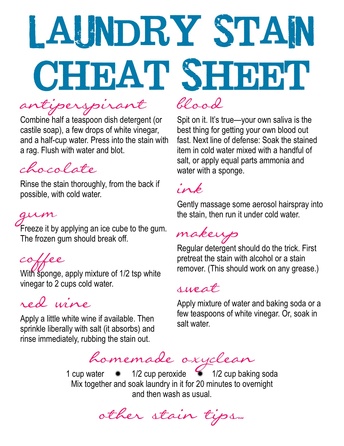Do you know how to treat a coffee stain? Open a checking account? Change a tire? Be a decent human being to any roommate who may be thrown your way?
Maybe you know all of these things already, in which case, I apologize for being overly pedantic. Meanwhile, I freely admit to you, my clients, my mom, and most of all, to myself, that I sure as heck didn't. I figured them out over my first year, but still, I wish I had been more prepared for some of college-life's essential skills outside of the classroom. Fortunately, there's plenty of people willing to show you or, if you can't bear to reveal you don't know how to work the dryer, lots of online sources to guide you.
Maybe you know all of these things already, in which case, I apologize for being overly pedantic. Meanwhile, I freely admit to you, my clients, my mom, and most of all, to myself, that I sure as heck didn't. I figured them out over my first year, but still, I wish I had been more prepared for some of college-life's essential skills outside of the classroom. Fortunately, there's plenty of people willing to show you or, if you can't bear to reveal you don't know how to work the dryer, lots of online sources to guide you.
1. Laundry
There are some young people out there who have others doing their laundry for them until the day they arrive at college. I was not one of these privileged elite; my mother had all of us, even my younger brother, trained in doing our own loads. And can you blame her? Laundry is annoying. But it's worth it, since there are few joys greater in life than the rejuvenating effects of clean sheet day.
So, in terms of laundry, make sure you know how to:
Sometimes it is an option for students to have their laundry sent out. Look, I'm not trying to be all judgey but...I'm just going to go ahead and be judgey. Unless you are taking seven classes a semester, play a varsity sport, and are president of your fraternity, you can find the time to do your own damn laundry. You've got to learn sometime.
So, in terms of laundry, make sure you know how to:
- How to operate a washing machine and dryer
- The settings for washing and drying your clothes and linens
- Attend to stains
- Change your linens reasonably often (i.e. more than once a semester)
Sometimes it is an option for students to have their laundry sent out. Look, I'm not trying to be all judgey but...I'm just going to go ahead and be judgey. Unless you are taking seven classes a semester, play a varsity sport, and are president of your fraternity, you can find the time to do your own damn laundry. You've got to learn sometime.

2. Finances
I didn't realize it at the time, but I had the most amazing 5th grade teacher. Mrs. Null gave us all fake checkbooks at the beginning of the school year. We learned how to fill out checks, submitting payments for candy and prizes after we earned Null-Bucks (the most valuable currency as far as Kings Elementary School students were concerned). We had to track our expenditures and income for the entire year.
So I entered college understanding how to balance a checkbook. But then all banking went online, and I'm concerned that students no longer have to confront withdrawals in that active way balancing a checkbook requires. So my suggestion is to play an active role in your spending. Make a budget, understand things like interest rates and overdraft penalties, and know how much disposable income you actually have (if any).
Beware of credit cards. If your parents give you one for an emergency, make sure everybody agrees what constitutes an emergency. Just say no to stores who want you to open up a card. Now's not the best time to be juggling multiple lines of credit. And they know that, people! These are predatory measures by stores hoping to rope young people into a cycle of never-ending high-interest payments.
So I entered college understanding how to balance a checkbook. But then all banking went online, and I'm concerned that students no longer have to confront withdrawals in that active way balancing a checkbook requires. So my suggestion is to play an active role in your spending. Make a budget, understand things like interest rates and overdraft penalties, and know how much disposable income you actually have (if any).
Beware of credit cards. If your parents give you one for an emergency, make sure everybody agrees what constitutes an emergency. Just say no to stores who want you to open up a card. Now's not the best time to be juggling multiple lines of credit. And they know that, people! These are predatory measures by stores hoping to rope young people into a cycle of never-ending high-interest payments.
3. Recognize and Treat Illness
When you're still living at home and in high school, you are used to relying on external confirmation that you are, indeed, ill enough to skip class. In college that's a personal call. Obviously the professor is going to roll her eyes at any student who lets a sniffle stop them from showing up every other Friday, but it is certainly acceptable to stay home when you have a contagious illness with debilitating symptoms.
I'm not going to try and talk you into going to class when you've been puking all morning from the flu. You need to rest and recover, and yes, even walking seven minutes across campus to sit in a 75 minute lecture might be more than your body can handle. Plus, you don't want to spread the illness to others.
Understand that if you're sick, you are allowed to stay in bed, and should contact Health Services if you get to a point where you cannot take care of yourself.
Don't the same mistake I did, trying to push through. I only ended up delaying my recovery. It wasn't like I was making slam dunks in class when I was barely keeping my eyes open and my barfiness contained.
I'm not going to try and talk you into going to class when you've been puking all morning from the flu. You need to rest and recover, and yes, even walking seven minutes across campus to sit in a 75 minute lecture might be more than your body can handle. Plus, you don't want to spread the illness to others.
Understand that if you're sick, you are allowed to stay in bed, and should contact Health Services if you get to a point where you cannot take care of yourself.
Don't the same mistake I did, trying to push through. I only ended up delaying my recovery. It wasn't like I was making slam dunks in class when I was barely keeping my eyes open and my barfiness contained.
4. BeING a Good RoommATE
I've been incredibly lucky in that I've had mainly exceptional roommates, who understood how to respect each other's space and possessions. It helped, however, that I lived with friends. But what happens if you are a freshman, assigned to live with someone you've never met before? Here's a couple of habits I advise implementing early on:
It's nice, but not mandatory to offer:
In other words, in the scenario where you are just trying to get along, concentrate on respecting the other people's space and belongings. In a more friendly environment, consider ways you can contribute to your roommates' happiness and comfort.
- Take turns tending to the garbage so it doesn't become a passive-aggressive game of balancing granola bar wrappers on a tenuous Mount Crap
- Headphones, unless you find someone who has the exact same musical preferences as you when you're both in the room (ask before blasting music)
- Be in charge of your own schedule. It's not your roommate's fault that you slept through your alarm and he didn't come back after breakfast to make sure you are up
- Ask before bringing friends, dates, or significant others to hang out in the room for more than an hour
- And definitely ask before having friends, dates, or significant others sleep over in the room
- Those aren't your clothes / shoes / stapler / Funyans. So don't take them without asking
It's nice, but not mandatory to offer:
- You will be in charge of vacuuming (or some other chore you don't mind assuming as yours)
- You can set up a backup alarm on your phone if your roommate is worried about sleeping through his before a big test
- You can let your friend and her boyfriend have the room from 9 to midnight to watch a movie, since you know how difficult it is for them to have alone time on campus
- Tell your roommates that the snacks you bought for midterm week are communal and people are free to help themselves
In other words, in the scenario where you are just trying to get along, concentrate on respecting the other people's space and belongings. In a more friendly environment, consider ways you can contribute to your roommates' happiness and comfort.
5. Car MAINTENANCE and Travel Alternatives
I didn't have a car during my undergrad or master's programs, but the people who did seemed to have a real headache on their hands. Cars break down and need costly repairs. Gas money. Flat tires. People always asking for rides to the airport at 5 am on a Thursday. Blizzards requiring you to dig out the vehicle with your hands because the ice scraper is locked in the car buried under the snow.
If you don't have a car, make sure you know how to navigate the local city transportation. Buses are rarely (if ever) my preferred mode of transportation, but they are inexpensive and semi-reliable. The subway is slightly better. Trains or light-rails now run through major cities to help keep traffic down. Typically there are student rates, but fares are generally low already. Buy month-long passes to save.
You could do what I did when I was going to school in Boston, and just walk. I was trying to save money and avoid crowds. Unfortunately that meant walking 5 miles round-trip in rain or snow or extreme heat.
I wasn't able to afford my first car (well, to lease a car) until I was 24. Honestly, I had to re-learn how to pump gas, work the headlights, and figure out how and when to take the car in for maintenance. I could still parallel park with ease, however, which was an odd thing to have stick with me.
Make sure when you are taking a car to school you know the parking situation and related costs, where to take the car if there is a problem, how to fix a flat tire, and how to say no if there's that one guy expecting rides all over town. Or to at least ask for gas money.
If you don't have a car, make sure you know how to navigate the local city transportation. Buses are rarely (if ever) my preferred mode of transportation, but they are inexpensive and semi-reliable. The subway is slightly better. Trains or light-rails now run through major cities to help keep traffic down. Typically there are student rates, but fares are generally low already. Buy month-long passes to save.
You could do what I did when I was going to school in Boston, and just walk. I was trying to save money and avoid crowds. Unfortunately that meant walking 5 miles round-trip in rain or snow or extreme heat.
I wasn't able to afford my first car (well, to lease a car) until I was 24. Honestly, I had to re-learn how to pump gas, work the headlights, and figure out how and when to take the car in for maintenance. I could still parallel park with ease, however, which was an odd thing to have stick with me.
Make sure when you are taking a car to school you know the parking situation and related costs, where to take the car if there is a problem, how to fix a flat tire, and how to say no if there's that one guy expecting rides all over town. Or to at least ask for gas money.
6. How To EMail And Make A Phone Call
Nope, not a joke. There is an immense technology gap between today's students and the people are they interacting with in the academic and professional realms. Texting is the most common form of communication among young adults. The problem is, you can't text a professor or your employer (in most cases).
Make sure you understand how to send a well-written email to your instructor, that has fundamental elements of etiquette, such as a greeting and farewell. If it's long, use paragraphs. Skip "abbrevs" and emoticons. You aren't texting your friend to see if she wants to get fro-yo in the DH before watching HIMYM (who just understood all that?).
And when you need to handle something that requires a real-time conversation, pick up the phone and call.
It took me a while to get over my phone phobia. Even now I prefer email infinitely to picking up the phone. But I had to get over it some years ago because the majority of people who were older than me by five years or more wanted a phone call when we needed to touch base.
Make sure you understand how to send a well-written email to your instructor, that has fundamental elements of etiquette, such as a greeting and farewell. If it's long, use paragraphs. Skip "abbrevs" and emoticons. You aren't texting your friend to see if she wants to get fro-yo in the DH before watching HIMYM (who just understood all that?).
And when you need to handle something that requires a real-time conversation, pick up the phone and call.
It took me a while to get over my phone phobia. Even now I prefer email infinitely to picking up the phone. But I had to get over it some years ago because the majority of people who were older than me by five years or more wanted a phone call when we needed to touch base.
Catching Up
Ultimately, the list of what you need to know before arriving to college is going to differ from person to person. Maybe you already knew all these things, in which case, you're ahead of the curve. And if you just realized you have a lot to learn, there's plenty of time to catch up.
You'll be fine. Just make sure you know how to get yourself to class, use a phone beyond texting, get yourself to the doctor, keep your clothes clean, and remember to eat a vegetable every once in a while.
You'll be fine. Just make sure you know how to get yourself to class, use a phone beyond texting, get yourself to the doctor, keep your clothes clean, and remember to eat a vegetable every once in a while.




